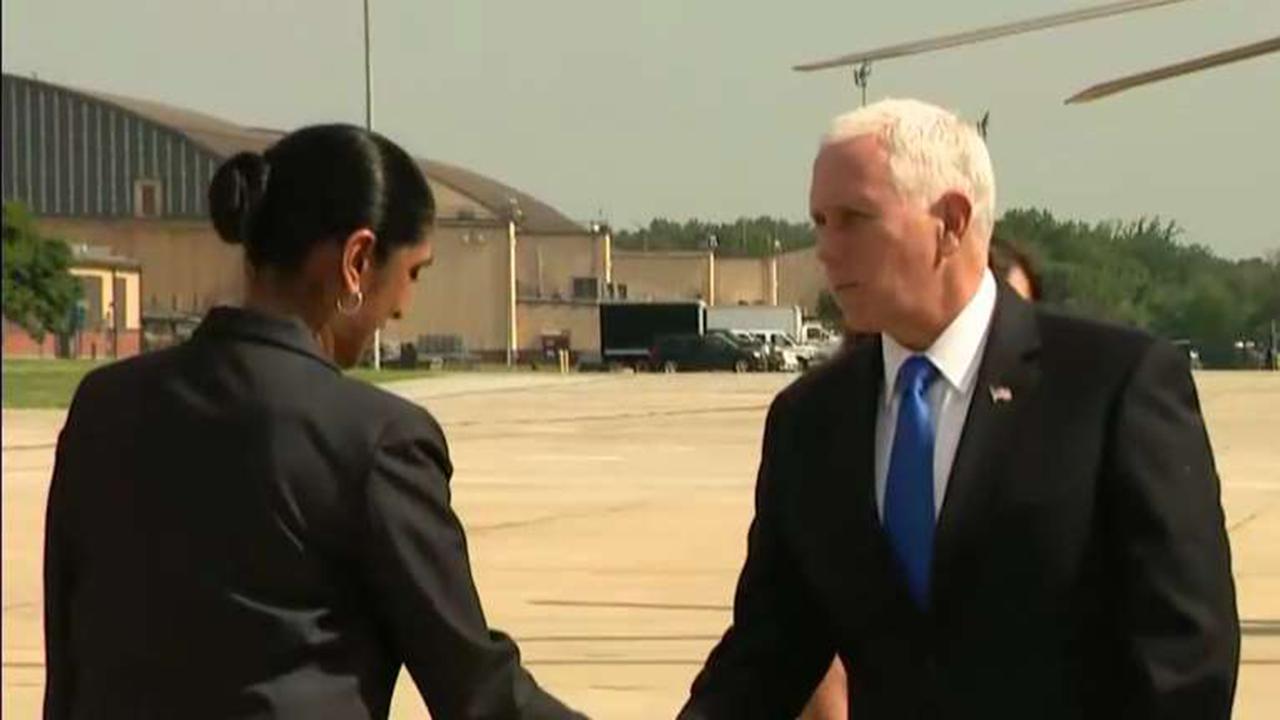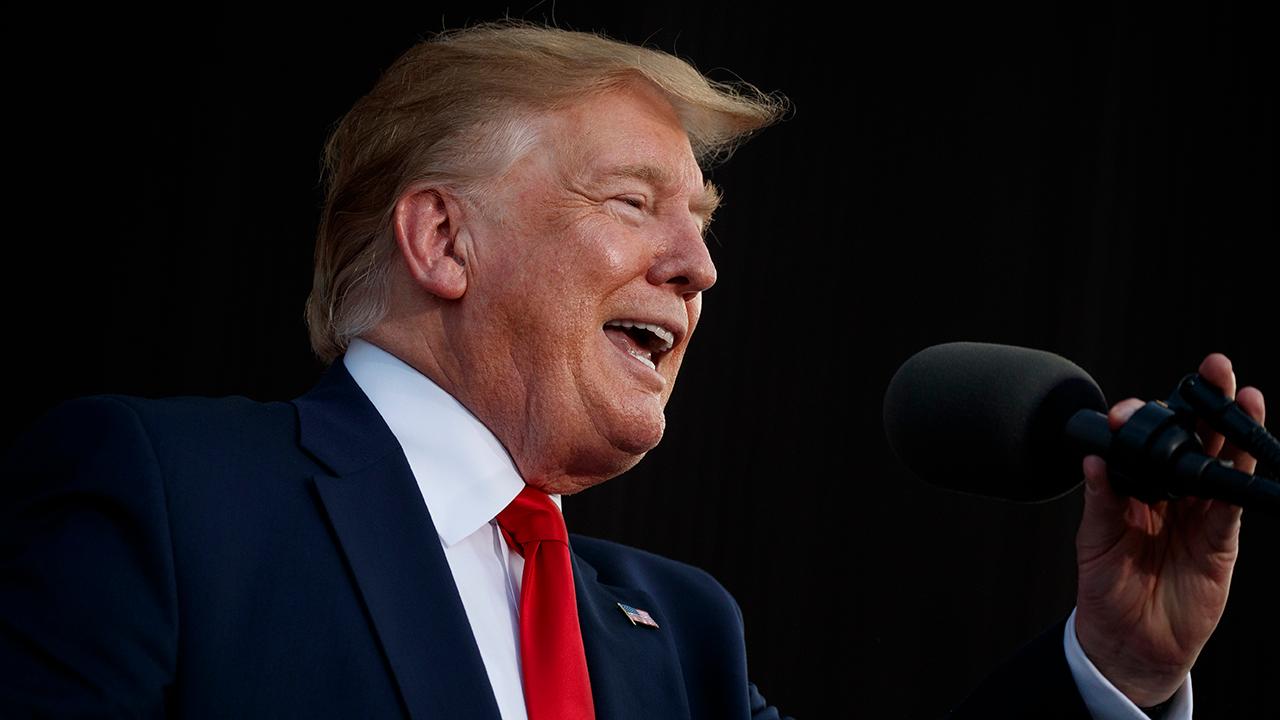GOP Senators express skepticism over Mexico tariffs
CBP reports 'full blown emergency' at the border; reaction from former CKE restaurants CEO Andy Puzder and former Obama-era chief economist Austan Goolsbee.
The Allied invasion of the Normandy beaches in 1944 enabled some lawmakers to escape the U.S. Capitol 75 years later.
Reporters swarmed the Senate wing of the Capitol Wednesday afternoon, peppering every GOP senator they could find about President Trump's plan to slap tariffs on Mexico. Most Republicans worry about how such a maneuver could imperil the U.S. economically. But many Republicans are also concerned about challenging the President and drawing his ire. So everyone was searching for a convenient escape hatch.
Buses would line up on the Capitol tarmac later Wednesday to escort senators to the airport so they could fly to France for ceremonies marking the 75th anniversary of D-Day. Republican senators were more than happy that Congress made it a short week so lawmakers could flee to Europe and avoid questions by pesky scribes.
Many senators responded to reporters' questions with vanilla bromides. Remarks like "that's a hypothetical" and "we'll see" pocked many conversations.
Sen. Joni Ernst, R-Iowa faces what could be a competitive re-election race in a battleground state. President Trump won Iowa in 2016, but Democrats flipped two House seats there last year. The tariffs would be brutal for Iowa farmers, but Ernst didn’t directly answer when asked if she could oppose the president on the issue.
"It's certainly harmful for Iowa," Ernst said as she headed for the Senate chamber.
"I think there is reluctance to long-term, enforced tariffs," said Sen. Ron Johnson, R-Wis.
Senate Finance Committee Chairman Chuck Grassley, R-Iowa, suggested that the tariff question "won't be an issue," adding "there will be some things to preclude that from happening."
"We're all hoping this [tariff] plan doesn't get executed," said Senate Majority Whip John Thune, R-S.D. But Thune conceded that if Trump keeps his word, "then it becomes real."
"There's a point where tariff fatigue sets in," said Sen. Mike Braun, R-Ind. "If it starts at five [percent], it will end up with 25 [percent] very quickly."
Braun said implementing tariffs "would put the USMCA [the proposed trade pact between the United States, Mexico and Canada] in peril."
When asked by Jared Halpern of Fox News Radio if everyone was searching for an "exit ramp," Sen. David Perdue, R-Ga., conceded that "exit ramp" was the appropriate term to use when describing the conundrum.
Like Ernst, Perdue faces re-election in 2020 and Georgia is a state which could move into the "swing" column by then. The Peach State has shown some Democratic energy of late, and that could have consequences for Perdue's re-election effort. Still, the senator is standing foursquare behind Trump when it comes to tariffs.
"He has to use a hammer," said Perdue when describing the President’s approach with Mexico. Perdue asserted he'd even endorse 25 percent tariffs on America's southern neighbor because "we're being invaded now."
But not every Republican feels that way. There are divisions among GOPers about how to pursue the tariff quandary. Back the President and you may be standing against the economic interests of your state. That’s why some congressional Republicans may try to engineer a vote to block or possibly rebuke President Trump if he imposes tariffs on Mexico.
Any action on such a measure will hinge on one thing: the math. Everything on Capitol Hill boils down to the math. And if Republicans don't think they can command a veto-proof supermajority to override a presidential veto, why would they want to get on record over such a controversial issue and risk drawing the ire of the president?
Lawmakers first want to see what Trump might do – as well as examine a possible executive order itself. Most Republicans don't want to be on the hook for something which may never see the light of day.
House Majority Leader Steny Hoyer, D-Md., noted Wednesday that previous efforts to override presidential vetoes had fallen short.
"We haven't been too successful in getting to a number that's even close to a veto-proof piece of legislation," he said.
A successful veto override requires a two-thirds vote by both bodies: 67 in the 100-member Senate and 289 in the 433-member House (there are currently two North Carolina seats vacant). There have only been 111 successful veto overrides in U.S. history.
In March, the House failed to override Trump’s veto on a resolution to disapprove of his declaration of a national emergency for the southern border. The House voted 248-181 to override the veto but fell 38 votes short of the override threshold.
In May, the Senate voted 53-45 to override Trump's veto of a measure to bar the U.S. from helping Saudi Arabia-backed forces in Yemen's civil war. But with 98 senators casting ballots, the Senate needed 65 'yea' votes for an override.
So, here is what could happen if the President implements tariffs on Mexico:
Lawmakers from both sides would have to first study the executive order to understand exactly what it says.
THE POLITICS OF TRUMP'S TARIFF AND IMMIGRATION POLICIES
Then, lawmakers would likely develop a "resolution of disapproval." Sources tell Fox the statute in play here is the International Emergency Economic Powers Act (IEEPA). The resolution would argue that Trump is abusing his powers when it comes to trade and his emergency declaration is out of alignment with IEEPA.
Adopting the resolution of disapproval requires a simple majority in the House and Senate. Such a resolution would most likely originate in the House.
Trump would then have to veto the resolution, the third veto of his presidency. The White House would then return the package to Capitol Hill for a prospective override attempt. The resolution would first go to the House, the body which originated the resolution of disapproval. If the House overrides the veto, the measure then goes to the Senate for its shot. If both chambers secure a 2/3 vote, the veto is overridden.
Where are the votes to block the president?
"It's hard to know," Thune said Wednesday. "We haven't whipped it."
But all of this may be moot if the tariffs never go into effect. Senate Minority Leader Chuck Schumer, D-N.Y., has expressed doubt that Trump will actually impose the tariffs.
"The President has a tendency for bluster," Schumer said. "There are many examples of the President taking a maximalist position before eventually backing off."
Mexican Foreign Secretary Marcelo Erbrard visited the Capitol on Tuesday to talk with Grassley and House Speaker Nancy Pelosi, D-Calif. Ebrard noted that the Mexican Senate was already debating the USMCA.
Won't the tariff threat jeopardize passage of the USMCA?
"We are going to have our best effort in order to avoid complications," said Erbrard at the Capitol.
When asked if he thought Trump was bluffing, Erbrard replied: "Friday I can tell exactly what is going on."
But if Trump isn't bluffing, there will be repercussions for lawmakers, who are struggling with their own political calculus.
House Agriculture Committee Chairman Collin Peterson, D-Minn., captures the quintessence of this puzzle. Peterson is one of the most moderate Democrats in the House. He represents a conservative, rural district and won re-election to a 15th term in 2018 with 52 percent of the vote. However, President Trump carried Peterson’s district in 2016 by 30 points.
Peterson says the USMCA is "dead in the water" until issues are resolved with Mexico. Yet Peterson says farmers in his district "are still with Trump."
Why?
"It's a good question," said Peterson, who noted that farmers back home already voted against the interests of their wallet. "I can’t explain it. I think they just don't like Democrats that much."
Yet, those voters seem to like Peterson.
"Well," he said, "I'm not normal."
CLICK HERE TO GET THE FOX NEWS APP
This crystalizes the predicament facing lawmakers. Side with the president, even if it flies in the face of economic benefit to their district? Or oppose Trump out of fear of protecting their voters?
Most lawmakers didn't have to make that choice this week.
It's little wonder so many would rather have been elsewhere.



















































